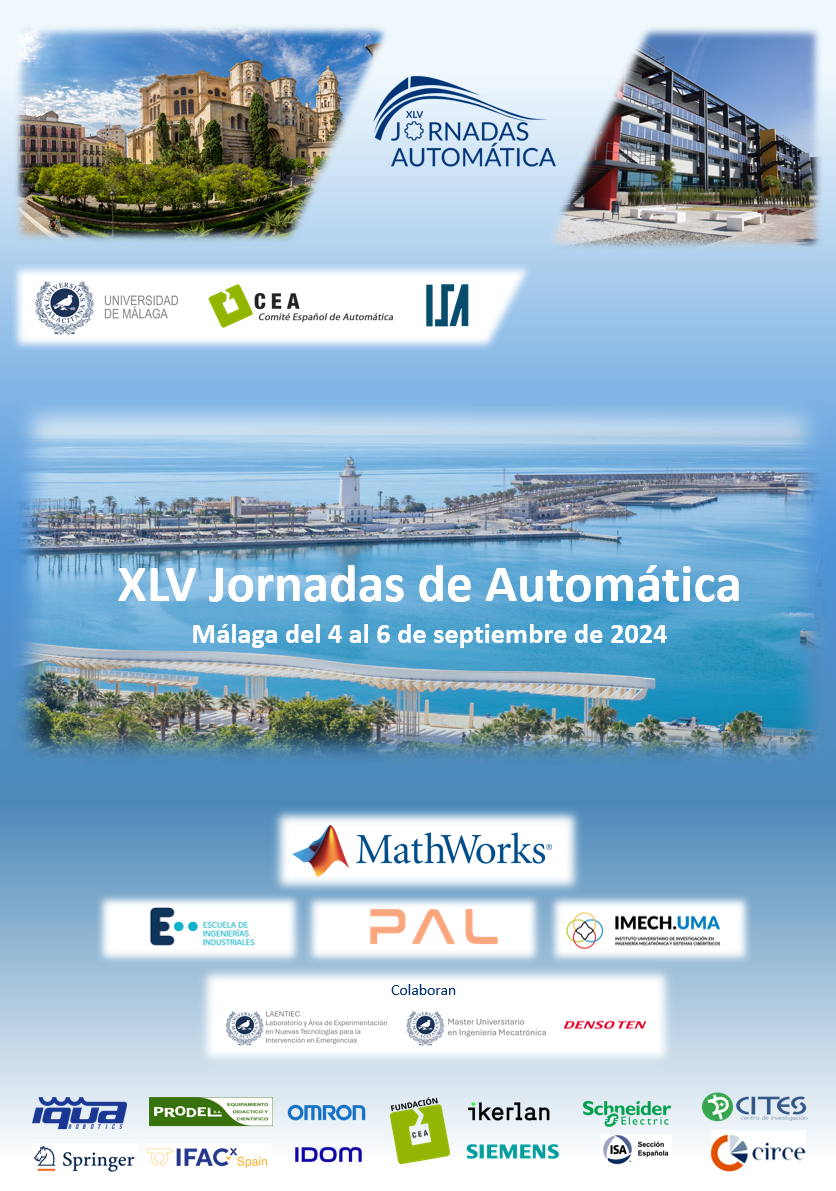Temperature control for a PEM electrolyser powered by a renewable source
DOI:
https://doi.org/10.17979/ja-cea.2024.45.10894Palabras clave:
Green hydrogen, PEM electrolyser, Model Predictive Control, Disturbance model, Temperature ControlResumen
This article addresses developing and applying a model-based controller for a PEM (Proton Exchange Membrane) electrolyser. The primary objective is to optimise temperature control, aiming for greater efficiency in hydrogen production and extended system lifespan. These two benefits are compromised when the electrolyser is subject to high temperatures exceeding its nominal temperature. Such conditions can occur when the system is powered by renewable sources, which can operate at high current densities due to their variability and intermittency. The proposed controller employs an MPC (Model Predictive Control) combined with a disturbance model to promote decoupling in handling disturbances and introduce an additional degree of freedom to the control strategy. Simulation results demonstrate the robust performance of the controller in managing system nonlinearities, ensuring desired reference tracking for the process.
Referencias
Benghanem, M., Almohamadi, H., Haddad, S., Mellit, A., Chettibi, N., 2024. The effect of voltage and electrode types on hydrogen production powered by photovoltaic system using alkaline and pem electrolyzers. International Journal of Hydrogen Energy 57, 625–636.
Camacho, E., Bordons, C., 2007. Model Predictive control. Advanced Textbooks in Control and Signal Processing. Springer, London.
Carmo, M., Fritz, D. L., Mergel, J., Stolten, D., 2013. A comprehensive review on pem water electrolysis. International Journal of Hydrogen Energy 38, 4901–4934.
Espinosa-Lopez, M., Darras, C., Poggi, P., Glises, R., Baucour, P., Rakotondrainibe, A., Besse, S., Serre-Combe, P., 2018. Modelling and experimental validation of a 46 kw pem high pressure water electrolyzer. Renewable Energy 119, 160–173.
Keller, R., Rauls, E., Hehemann, M., M¨uller, M., Carmo, M., 2022. An adaptive model-based feedforward temperature control of a 100 kw pem electrolyzer. Control Engineering Practice 120, 104992.
Maia, R. G. T., Garcia, K. C., 2023. What they say, what they do and how they do it: An evaluation of the energy transition and ghg emissions of electricity companies. Energy Policy 174, 113462.
Molina, P., Rios, C., de Leon, C. M., Brey, J., 2024. Heat management system design and implementation in a pem water electrolyser. International Journal of Hydrogen Energy.
Mora, M., Bordons, C., 2022. Desarrollo y validación experimental del modelo dinámico de un electrolizador pem de 1kw para su integración con generación renovable. XLIII Jornadas de Automática: libro de actas, 560–567.
Ogumerem, G. S., Pistikopoulos, E. N., 2020. Parametric optimization and control for a smart proton exchange membrane water electrolysis (pemwe) system. Journal of Process Control 91, 37–49.
United Nations, 2015. The 2030 agenda for sustainable development. https://sustainabledevelopment.un.org/post2015/transformingourworld, accessed: 2024-05-28.
Descargas
Publicado
Número
Sección
Licencia
Derechos de autor 2024 Juliana Sobral Barros de Queiroz, Bismark Claure Torrico, Fabrício González Nogueira, Carlos Bordons, Miguel Angel Ridao

Esta obra está bajo una licencia internacional Creative Commons Atribución-NoComercial-CompartirIgual 4.0.





